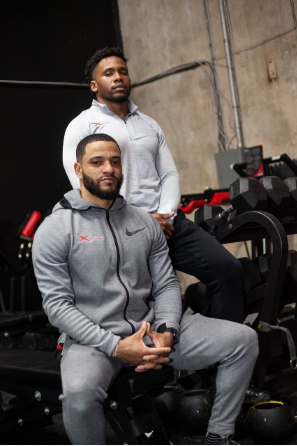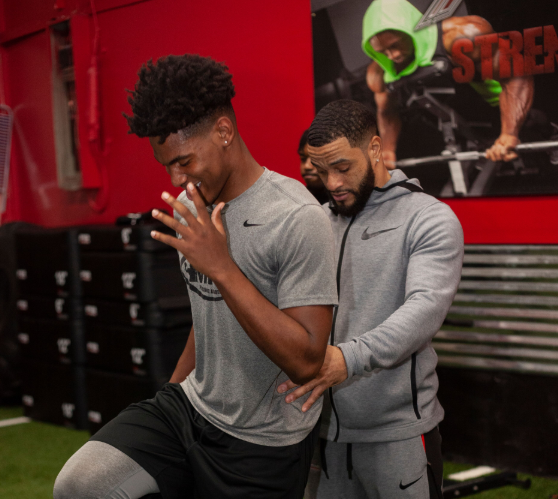By Ameera Steward
The Birmingham Times
(Second of three parts)
Every year, we hear and make the same New Year’s resolutions, and invariably health and wellness make the list. Most people make losing weight or getting back to the gym a priority—until around February, when people at the gym start dropping like flies and the only ones left are those who were there the year before.

To help you stick to your resolution and excel in health and wellness, the Birmingham Times turned to Kevin Brown, founder of downtown Birmingham’s Xtreme Fitness and Performance, and one of his fellow trainers, Valie Slater.
BT: Why are doctors always preaching exercise?
Brown: It all goes back to chronic diseases, a lot of which can be managed with exercise. … I’ve had clients on high blood pressure meds and things of that nature [who] incorporated exercise and went back to the doctor, and the doctor says, ‘You don’t need to take this anymore.’
“I feel like that is why some doctors preach exercise because it definitely helps cure a lot of these issues we have. A lot of people say, ‘It runs in the family.’ It doesn’t have to.
Slater: [Perhaps] the only reason ‘it runs in the family’ is because each generation practices the same routine, so at some point you’ve got to break it. Another thing: I feel like doctors preach exercise a lot because it gets you moving. You can’t exercise without movement. Your heart, for instance, is a muscle. Just like you want to build you biceps, you can build your heart muscle, too. Exercise gives you better cardiac health as far as opening up your arteries and veins, giving your heart a good workout. Now your blood pressure goes down, and you have a healthy habit of exercising, so now your heart is a little bit stronger and it’s going to pump blood to your other organs.
BT: What are some important workout tips?
Slater: You don’t necessarily need to go to a facility to work out. Most people get that confused and think they have to be a member of a gym, which is kind of intimidating to some people. You can get a workout anywhere. You can be around the house cleaning up; just get up and get moving. If you’re at a cubicle, instead of sitting down, stand up at your computer. Anything.
Brown: I tell people, especially women, to throw away the scale. If you’re going through a regimen or training, throw away the scale. It may not say what you want it to say, but if you [can comfortably slip into a pair of formerly too-tight] jeans, [then you reached your goal]. The number on the scale fluctuates, but that doesn’t mean you haven’t lost weight. Different things come into play, such as muscle weight, body fat, whether you just ate, what you ate, etc. The number could change between today and tomorrow.
BT: How often should the average person work out?
Brown: I always like to say between maybe two to three days a week, but [it depends on the person]. For somebody who is new to working out, I always like to tell them start off slow and then build [on that]. So, if you find maybe two days a week just to do something, then what happens a lot of time is you’ll feel yourself starting to build up from those two days a week. That’s when you can maybe throw in a third day. Now, with that third day, you kind of feel yourself building up from there and might want to throw in a fourth day. Probably the worst thing people do, [particularly those] who are just starting to work out, is get [frustrated when they feel sore]. If you’re [exercising] the right way, you’re going to be sore for the first week or so. A lot of people don’t understand that [the way to overcome soreness] is by [continuing to exercise], by doing it again and doing it again. Eventually, that’s when you start to notice that your body is getting stronger, you’re able to maybe work out longer, and now you’re able to maybe incorporate another day or two days.
BT: What are the main benefits of sweating during a workout?
Slater: You need to sweat. It’s no different than going to the restroom. You’re releasing different toxins, free radicals, etc. You’re not going to get that kind of sweat unless you are exercising, doing some form of work.
Brown: A lot of people don’t understand if you don’t sweat, that’s an issue: nine times out of 10, you’re dehydrated.
Slater: That goes back to a lack of movement. Most of our diseases come from a lack of movement, and what I mean by that is waste is stagnant in the body. [For instance], a person may not use the bathroom regularly, and those toxins build up. Eventually, that [leads to] different cancers, heart diseases, lung diseases, all derived from not expelling those different wastes and things [that build up in the] body. Skin is the body’s biggest organ, so when you sweat, you expel all the waste that’s stored in your body.
Check out Part 3: “Best Workouts for Beginners” in the Birmingham Times on Thursday, Jan. 17, 2019.
For Part 1, click here
For more on fitness in 2019, click here
Xtreme Fitness and Performance can be reached at 1509 3rd Ave S, Birmingham, AL 35233, (205) 687-0090




